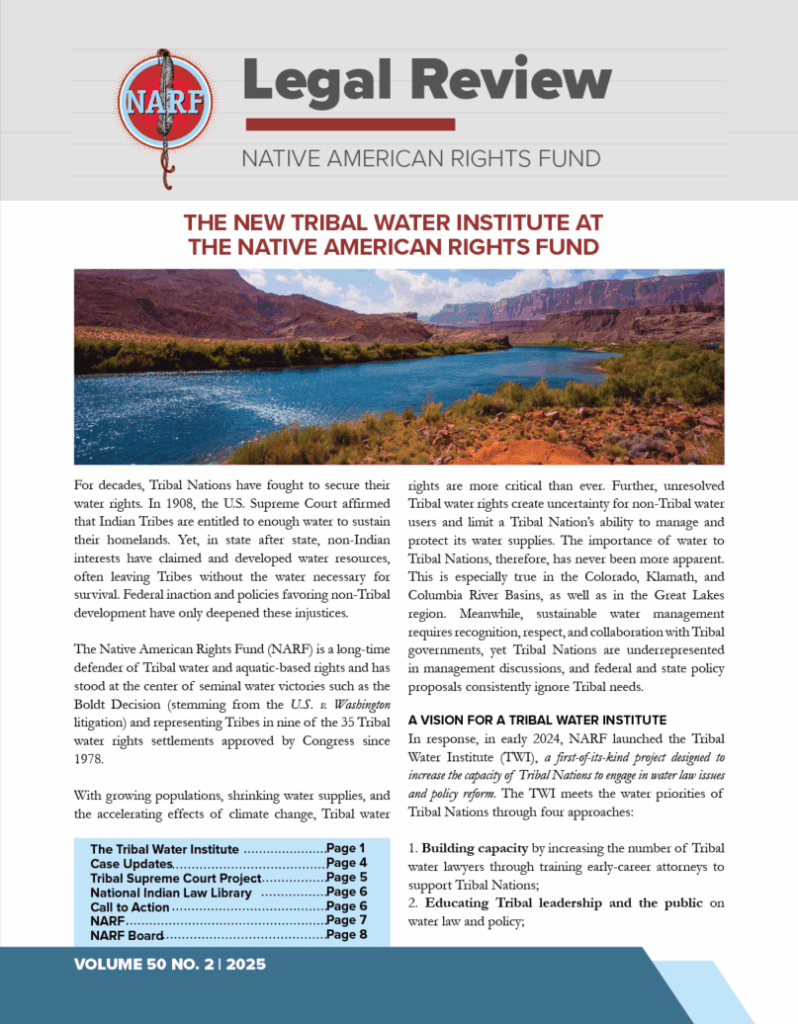
The NARF Legal Review is published semi-annually and provides updates on NARF’s cases and information on other timely Indian law topics. The most recent edition examines some of NARF’s cases from the Spring of 2025 through Fall of 2025. NARF’s cases featured in this edition of the Legal Review include:
The New Tribal Water Institute at NARF— For decades, Tribal Nations have fought to secure their water rights. In 1908, the U.S. Supreme Court affirmed that Indian Tribes are entitled to enough water to sustain their homelands. Yet, in state after state, non-Indian interests have claimed and developed water resources, often leaving Tribes without the water necessary for survival. Federal inaction and policies favoring non-Tribal development have only deepened these injustices. In response, in early 2024, NARF launched the Tribal Water Institute (TWI), a first-of-its-kind project designed to increase the capacity of Tribal Nations to engage in water law issues and policy reform.
Case Updates— Featuring: The Spirit Lake Tribe, the Turtle Mountain Band of Chippewa Indians, and Native voters have asked the U.S. Supreme Court to review their challenge to North Dakota’s legislative map. Represented by NARF, Campaign Legal Center, the Law Office of Bryan L. Sells, LLC, and Robins Kaplan LLP, the plaintiffs are fighting for fair representation for Native voters and defending the Voting Rights Act (VRA).
Along with a major win for Tribal sovereignty, the U.S. Supreme Court denied certiorari in RunItOneTime LLC v. United States, leaving in place lower court rulings that protect Tribal gaming rights. The case, brought by RunItOneTime (formerly Maverick Gaming), challenged the constitutionality of the Indian Gaming Regulatory Act (IGRA) and sought to invalidate all Tribal gaming compacts in Washington state.
National Indian Law Library— The 22nd Edition of the Bluebook is now available, and this long-awaited update includes specific information on citing the laws and treaties of Tribal Nations. Drafted with the careful attention and assistance of many members of the legal community including the National Indian Law Library’s Rachel Nelson, Rule 22 establishes clear guidance and standards for legal writing that cites Tribal law. Other relevant updates to the Bluebook include the addition of more inclusive examples and an updated source for citing individual Tribes.
Tribal Supreme Court Project—The Tribal Supreme Court Project is part of the Tribal Sovereignty Protection Initiative and is staffed by the National Congress of American Indians and NARF. The Project’s goals are to promote greater coordination and improve strategies on litigation that may affect the rights of all Tribal Nations. We encourage Tribes to contact the Project, especially when considering a petition for a writ of certiorari, prior to the Supreme Court accepting a case for review. You can find copies of briefs and opinions on the major cases we track at sct.narf.org.
You can learn more about NARF’s work, current and past, in the Legal Review archive.
More blog posts

